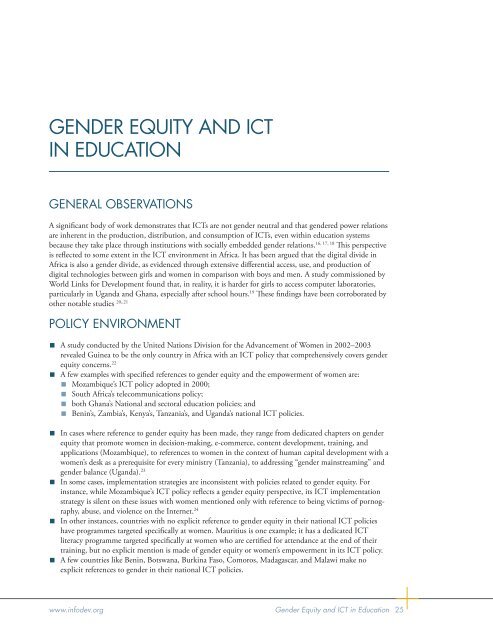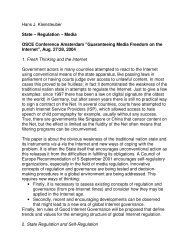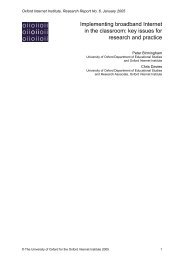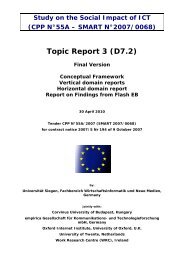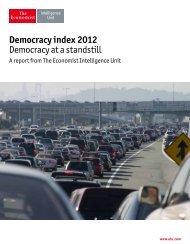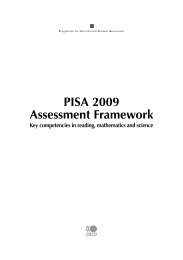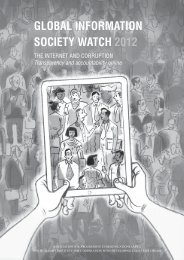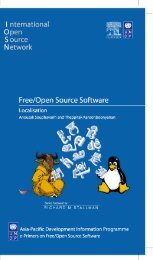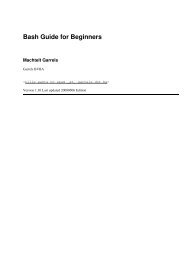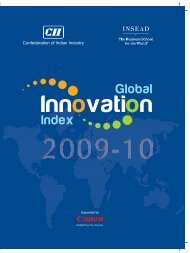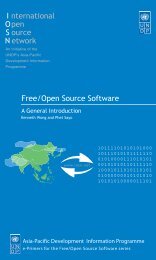SURVEY OF ICT AND EDUCATION IN AFRICA - infoDev
SURVEY OF ICT AND EDUCATION IN AFRICA - infoDev
SURVEY OF ICT AND EDUCATION IN AFRICA - infoDev
- No tags were found...
You also want an ePaper? Increase the reach of your titles
YUMPU automatically turns print PDFs into web optimized ePapers that Google loves.
Gender Equity and <strong>ICT</strong>in EducationGeneral ObservationsA significant body of work demonstrates that <strong>ICT</strong>s are not gender neutral and that gendered power relationsare inherent in the production, distribution, and consumption of <strong>ICT</strong>s, even within education systemsbecause they take place through institutions with socially embedded gender relations. 16, 17, 18 This perspectiveis reflected to some extent in the <strong>ICT</strong> environment in Africa. It has been argued that the digital divide inAfrica is also a gender divide, as evidenced through extensive differential access, use, and production ofdigital technologies between girls and women in comparison with boys and men. A study commissioned byWorld Links for Development found that, in reality, it is harder for girls to access computer laboratories,particularly in Uganda and Ghana, especially after school hours. 19 These findings have been corroborated byother notable studies 20,.21Policy EnvironmentnnnnnnA study conducted by the United Nations Division for the Advancement of Women in 2002–2003revealed Guinea to be the only country in Africa with an <strong>ICT</strong> policy that comprehensively covers genderequity concerns. 22A few examples with specified references to gender equity and the empowerment of women are:n Mozambique’s <strong>ICT</strong> policy adopted in 2000;n South Africa’s telecommunications policy;n both Ghana’s National and sectoral education policies; andn Benin’s, Zambia’s, Kenya’s, Tanzania’s, and Uganda’s national <strong>ICT</strong> policies.In cases where reference to gender equity has been made, they range from dedicated chapters on genderequity that promote women in decision-making, e-commerce, content development, training, andapplications (Mozambique), to references to women in the context of human capital development with awomen’s desk as a prerequisite for every ministry (Tanzania), to addressing “gender mainstreaming” andgender balance (Uganda). 23In some cases, implementation strategies are inconsistent with policies related to gender equity. Forinstance, while Mozambique’s <strong>ICT</strong> policy reflects a gender equity perspective, its <strong>ICT</strong> implementationstrategy is silent on these issues with women mentioned only with reference to being victims of pornography,abuse, and violence on the Internet. 24In other instances, countries with no explicit reference to gender equity in their national <strong>ICT</strong> policieshave programmes targeted specifically at women. Mauritius is one example; it has a dedicated <strong>ICT</strong>literacy programme targeted specifically at women who are certified for attendance at the end of theirtraining, but no explicit mention is made of gender equity or women’s empowerment in its <strong>ICT</strong> policy.A few countries like Benin, Botswana, Burkina Faso, Comoros, Madagascar, and Malawi make noexplicit references to gender in their national <strong>ICT</strong> policies.www.infodev.org Gender Equity and <strong>ICT</strong> in Education 25


